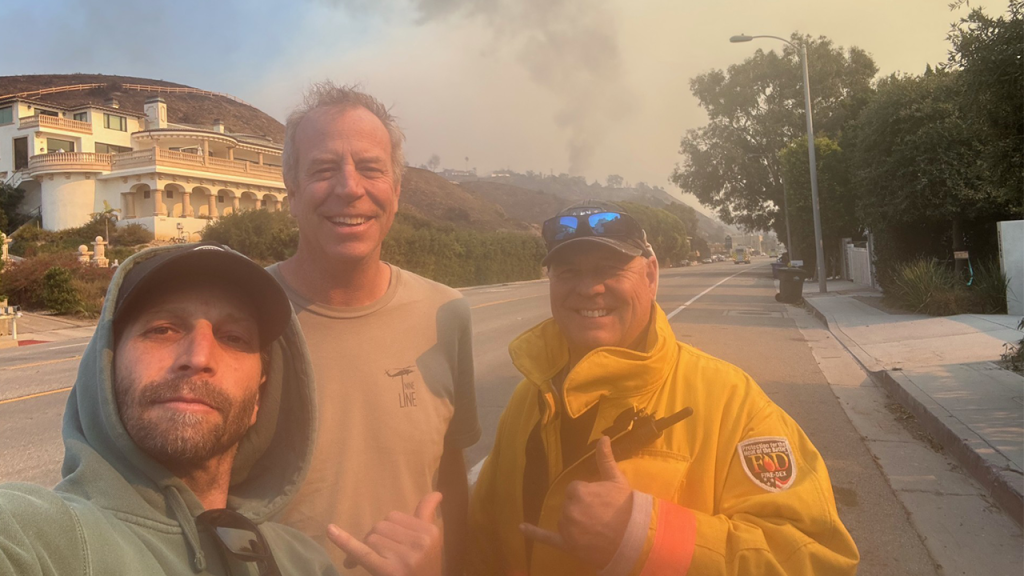The Palisades Fire, a recent wildfire that ravaged parts of Los Angeles County, brought to the forefront the crucial role of community-organized fire brigades in protecting homes and properties. Matt Diamond, a Malibu resident and surfer, established such a brigade following the devastating 2018 Woolsey Fire, which exposed the vulnerability of his community in the face of such disasters. His experience during the Woolsey Fire, where residents were left to fend for themselves due to a lack of official fire support, underscored the need for self-sufficiency and community-level preparedness. Diamond and his neighbors formed a makeshift firefighting unit, equipping themselves with basic tools and supplies, and patrolling the area to prevent the spread of the fire. This grassroots effort ultimately saved numerous homes and instilled a sense of empowerment within the community.
The recent Palisades Fire served as a testament to the effectiveness of Diamond’s brigade. As the fire rapidly advanced, Diamond, along with his team, sprang into action. Working alongside professional firefighters from Santa Barbara, they strategically defended homes and properties, leveraging their intimate knowledge of the terrain and neighborhood dynamics. Diamond’s personal account of the fire’s progression, highlighting his efforts to save his own home and belongings, including prized surfboards and musical equipment, paints a vivid picture of the chaotic and unpredictable nature of such disasters. The fire’s devastating impact extended beyond material possessions, with many of his friends and neighbors losing their homes and cherished memorabilia, highlighting the emotional toll of such events.
The brigade’s success in saving approximately ten homes underscores the potential of community-based firefighting initiatives. The domino effect, where saving one house can protect neighboring structures, highlights the strategic advantage of localized efforts. While the brigade’s primary focus was on safeguarding homes, their presence also served as a morale booster for residents grappling with the fear and uncertainty of the encroaching flames. Diamond’s experience demonstrates that even in the face of overwhelming natural disasters, organized community action can significantly mitigate losses and offer a sense of hope and agency.
The Palisades Fire, tragically, claimed one life, a poignant reminder of the devastating consequences of wildfires. The City of Malibu’s official statement acknowledging this loss emphasizes the profound impact of such disasters on the community and reinforces the need for collective resilience and support. The loss of life underscores the urgency of proactive measures to prevent and mitigate the impact of future wildfires. Beyond the immediate response to the fire, Diamond stressed the importance of ongoing community preparedness. He advocated for establishing communication channels with local first responders and creating independent communication networks within the community to ensure effective coordination during emergencies.
Diamond emphasizes the broader implications of the increasing frequency and intensity of natural disasters, attributing them to climate change. He advocates for proactive measures, including prescribed burns, to manage vegetation and reduce the risk of large-scale wildfires. Diamond criticizes the perceived hesitancy of government agencies to implement such measures, arguing that the potential consequences of inaction far outweigh the risks associated with controlled burns. He calls on government officials, particularly Governor Gavin Newsom, to prioritize fire prevention strategies and streamline bureaucratic processes to ensure effective land management practices. His call to action reflects a growing sentiment within communities affected by wildfires, emphasizing the need for a more proactive and comprehensive approach to wildfire management.
Diamond’s experiences during the Woolsey and Palisades fires highlight the critical role of community-based initiatives in disaster preparedness and response. His story emphasizes the importance of self-reliance, community organization, and proactive communication in mitigating the impact of natural disasters. His call for greater government action in implementing preventative measures, such as controlled burns, reflects a growing understanding of the need for a comprehensive and proactive approach to wildfire management. As climate change continues to exacerbate the risk of wildfires, Diamond’s story serves as a powerful example of the power of community action and a call for stronger leadership in addressing the challenges posed by increasingly frequent and intense natural disasters.


